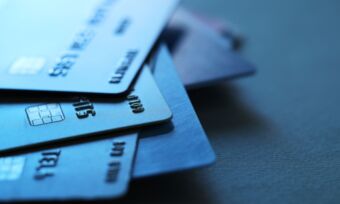Australians wipe $274 million in credit card debt in July

Australians have wiped an impressive $274 million off the nation’s total credit card bill in the space of one month—the biggest fall in three years in dollar terms.
The total debt accruing interest on personal credit cards now stands at $17.7 billion, according to yesterday’s RBA credit card figures, in original terms.
Credit card debt accruing interest often dips in July, as many Australians put their tax refunds towards paying down their balances, however, this is the biggest fall since July 2022.
← Mobile/tablet users, scroll sideways to view full table →
| Credit card debt attracting interest charges: personal cards | ||
|---|---|---|
| Amount | Monthly change | Year-on-year change |
| $17.7 billion | -$274 million
-2% |
-$73 million
-0.4% |
Source: RBA credit card statistics, July 2025, original data terms, excludes commercial cards.
Credit card accounts drop by more than 180k in 12 months
The number of personal credit card accounts has taken another dive this month, dropping by 25,481 in July, the largest drop so far this year. Over the full 12 months, the number of personal credit card accounts has dropped by 180,194 accounts (-2%).
The RBA figures also show more than 2 million (18%) personal credit card accounts were not active in July, meaning the account hadn’t had a single transaction recorded that month.
Although these cards weren’t clocking up purchases, the worry is cardholders could still be paying monthly or annual fees unnecessarily.
Spending drops despite rising prices
The total value of personal credit card transactions fell in July by $301 million (-1%) compared to the record high recorded in the previous month.
Debit card spending also eased in July, with combined credit and debit transactions falling by $1.9 billion from the record highs set the previous month.
← Mobile/tablet users, scroll sideways to view full table →
| Value of card transactions: RBA | |||
|---|---|---|---|
| Amount – July 2025 | Monthly change | Change from 1 yr ago | |
| Credit cards – personal cards | $28.6 billion | -$301 million
-1% |
+$1.4 billion
+5% |
| Debit cards | $54.2 billion | -$1.6 billion
-3% |
+$2.6 billion
+5% |
| Total | $82.7 billion | -$1.9 billion
-2% |
+$4.0 billion
+5% |
Source: RBA credit card statistics, personal cards, July 2025, released 8 Sept 2025, seasonally adjusted data.
Canstar’s data insights director, Sally Tindall says, “Australia’s total credit card bill dropped by an impressive $274 million in July, most likely fuelled by money back from tax returns.”
“History shows a little extra cash in July usually goes straight onto these high-interest cards. However, this July was the biggest monthly drop in credit card debt accruing interest we’ve seen in three years.
“It’s great to see Australians finally making a dent in their credit card debt, but with $17.7 billion still accruing interest, at an average rate of 18.69 per cent, there’s clearly plenty more work to do.
“The sizable drop in credit card debt was accompanied by a fall in the number of credit card accounts. This suggests at least some Australians managed to kick their debt entirely and cut off the umbilical cord.
“Spending on credit and debit cards also took a breather in July, dropping nearly $2 billion combined from the record highs the month before. Even with prices creeping up, people are clearly prioritising debt repayment over splurging.
“If this trend continues, Australians adding less to their cards should make it easier to keep chipping away at their debts in the months ahead.
“If you haven’t managed to clear your credit card debt in full, consider taking action. At a minimum, switching to a lower rate card can help ease the interest pain, however, consolidating debts into a personal loan is also an option worth considering, particularly for those with persistent debt.”
Tips to help clear credit card debt
- Pay more than the minimum. Making only minimum repayments keeps you in debt longer and costs more in interest. Even an extra $100 to $200 a month can make a big difference.
- Use windfalls wisely. Tax refunds, work bonuses, or other unexpected cash can go straight to paying down high-interest cards.
- Cut unnecessary spending. Track your expenses and identify areas to reduce discretionary spending. The money you save can go directly onto your card balances.
- Consider a personal loan. If your credit card interest is high, a personal loan with a lower rate can potentially help you save on interest and force you to repay in regular installments, helping you steadily chip away at your debt.
- Automate payments. Set up automatic repayments to make sure you never miss a due date. Consistent payments help reduce interest and keep you on track.
This article was reviewed by our Finance Editor Jessica Pridmore before it was updated, as part of our fact-checking process.






